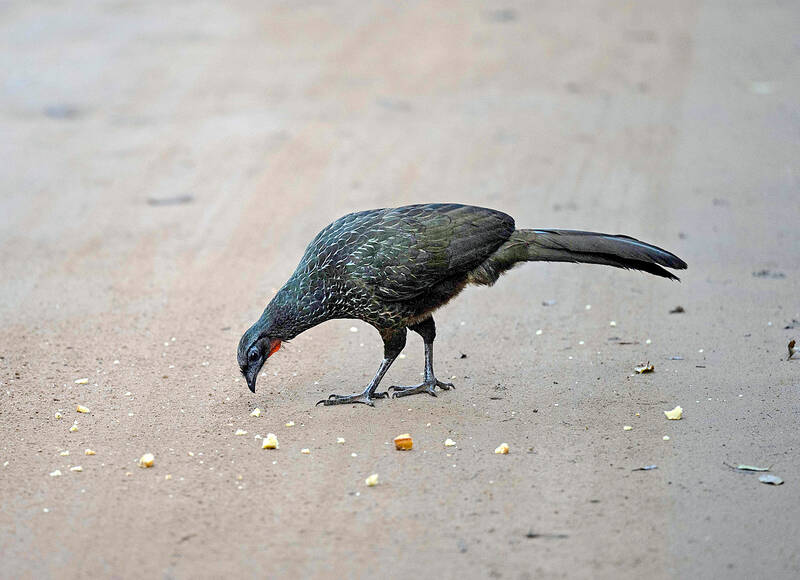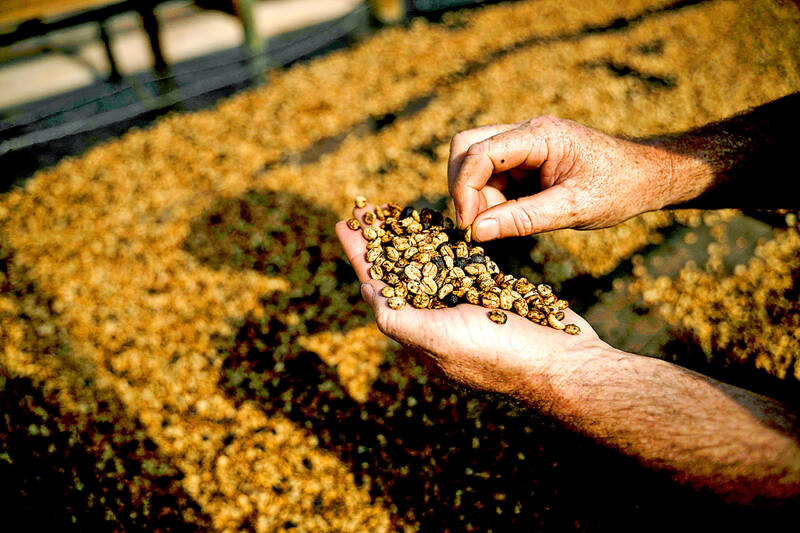In Brazil, the proverbial goose that lays the golden egg is in reality something closer to a pheasant that excretes coffee beans.
At the Camocim coffee farm, deep in the bucolic hills of Espirito Santo state in Brazil’s southeast, jacus — a type of pheasant native to tropical forests there — are considered some of the most astute pickers — or rather, eaters — of coffee cherries.
“He chooses the best fruits, the ripest,” said worker Agnael Costa, 23, delicately scooping up droppings left behind by one of the birds between two tree trunks. What goes in as ripe cherries comes out as beans, which can go on to be sold as some of the most delicious — and expensive — coffee in the world.

Photo: AFP
The coffee at Camocim grows in the middle of the lush forest, and the jacus there are wild.
“It was this agroforestry system that created the necessary conditions for this exotic coffee to exist here,” farm owner Henrique Sloper said.
Domestically, jacu coffee can sell for 1,118 reals (US$224) per kilogram — a price that can rise significantly upon export. Foreign distributors include British department store Harrods, among others.

Photo: AFP
The jacu, with its black feathers and red throat, was not always welcome at the farm. It was originally seen as a hungry pest feeding off precious crops.
However, when Sloper discovered “kopi luwak,” an expensive Indonesian coffee made with beans from civet excrement, he figured jacus might make good allies in the quest to make a better brew.
Kopi luwak sometimes has a bad reputation, with farmers accused of pressing civets — small mammals similar to weasels — into captivity to boost production. The wild jacus at Camocim roam, eat and poop at their leisure.
“It’s 100 percent natural,” farm production supervisor Rogerio Lemke said.
“The jacu is within its own natural habitat,” in Brazil’s Atlantic Forest, he added.
Linking production to the whims of a jacu’s appetite is just one of the reasons it fetches such a high price.
Jacu droppings look a bit like a cereal bar, with beige grains protruding from a blackish, pasty mess. Once collected and dried, the beans are carefully sorted and hulled, and put into a chilled room.
“It is naturally expensive. There is no way to make a jacu coffee at a low cost,” Sloper said.
All told, jacu coffee represents less than 2 percent of the estate’s production.
The bird also carries other advantages, for farmers and those seeking a cheaper — if less intestinally intimate — cup of Joe.
“It serves not only as a selector [of the best beans], but also as a harvest alarm” Sloper said. “Where it eats, the coffee is ripe.”
While jacus help select the best coffee, there is nothing in particular about their digestive system that imparts a different taste on the beans.
“The birds have an extremely short intestinal transit time,” coffee specialist Ensei Neto said. “So there is not exactly any kind of biochemical process, there is no time.”
Their digestive process is much faster than civets or elephants — another animal whose dung is used, in Thailand, to produce specialty coffee. Some think the fermentation process stemming from those animals’ longer digestion times imparts a better flavor on the resulting beans.
The jacu “only goes for the ripe fruits,” producing a coffee with “sweet notes, with good acidity,” Neto said. “It doesn’t add anything else, but the story is good.”
The jacus have found a fan in Poliana Cristiana Prego, 37, a Brazilian tourist who has come to visit Camocim.
“It’s a delicious coffee and the story behind its production is very original. It’s a new experience for us,” she said.
“Our customers are lovers of exotic products, but also those who value the idea of sustainable development,” Sloper said.
“The future of coffee will come from Brazil,” he said.
The country is already the world’s top producer.
Whether it comes from jacus or otherwise, Brazilian coffee “is showing the world that we really are able to do what nobody else can,” Sloper said.

Taiwan Semiconductor Manufacturing Co (TSMC, 台積電) secured a record 70.2 percent share of the global foundry business in the second quarter, up from 67.6 percent the previous quarter, and continued widening its lead over second-placed Samsung Electronics Co, TrendForce Corp (集邦科技) said on Monday. TSMC posted US$30.24 billion in sales in the April-to-June period, up 18.5 percent from the previous quarter, driven by major smartphone customers entering their ramp-up cycle and robust demand for artificial intelligence chips, laptops and PCs, which boosted wafer shipments and average selling prices, TrendForce said in a report. Samsung’s sales also grew in the second quarter, up

On Tuesday, US President Donald Trump weighed in on a pressing national issue: The rebranding of a restaurant chain. Last week, Cracker Barrel, a Tennessee company whose nationwide locations lean heavily on a cozy, old-timey aesthetic — “rocking chairs on the porch, a warm fire in the hearth, peg games on the table” — announced it was updating its logo. Uncle Herschel, the man who once appeared next to the letters with a barrel, was gone. It sparked ire on the right, with Donald Trump Jr leading a charge against the rebranding: “WTF is wrong with Cracker Barrel?!” Later, Trump Sr weighed

HEADWINDS: Upfront investment is unavoidable in the merger, but cost savings would materialize over time, TS Financial Holding Co president Welch Lin said TS Financial Holding Co (台新新光金控) said it would take about two years before the benefits of its merger with Shin Kong Financial Holding Co (新光金控) become evident, as the group prioritizes the consolidation of its major subsidiaries. “The group’s priority is to complete the consolidation of different subsidiaries,” Welch Lin (林維俊), president of the nation’s fourth-largest financial conglomerate by assets, told reporters during its first earnings briefing since the merger took effect on July 24. The asset management units are scheduled to merge in November, followed by life insurance in January next year and securities operations in April, Lin said. Banking integration,

LOOPHOLES: The move is to end a break that was aiding foreign producers without any similar benefit for US manufacturers, the US Department of Commerce said US President Donald Trump’s administration would make it harder for Samsung Electronics Co and SK Hynix Inc to ship critical equipment to their chipmaking operations in China, dealing a potential blow to the companies’ production in the world’s largest semiconductor market. The US Department of Commerce in a notice published on Friday said that it was revoking waivers for Samsung and SK Hynix to use US technologies in their Chinese operations. The companies had been operating in China under regulations that allow them to import chipmaking equipment without applying for a new license each time. The move would revise what is known